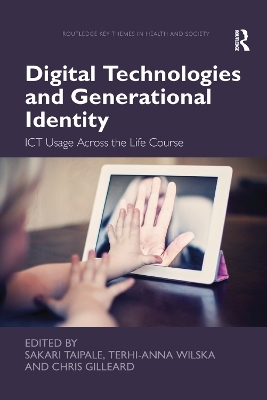
Digital Technologies and Generational Identity
Routledge (Verlag)
978-0-367-35245-5 (ISBN)
The short lifetime of digital technologies means that generational identities are difficult to establish around any particular technologies let alone around more far-reaching socio-technological ‘revolutions’. Examining the consumption and use of digital technologies throughout the stages of human development, this book provides a valuable overview of ICT usage and generational differences. It focuses on the fields of home, family and consumption as key arenas where these processes are being enacted, sometimes strengthening old distinctions, sometimes creating new ones, always embodying an inherent restlessness that affects all aspects and all stages of life.
Combining a collection of international perspectives from a range of fields, including social gerontology, social policy, sociology, anthropology and gender studies, Digital Technologies and Generational Identity weaves empirical evidence with theoretical insights on the role of digital technologies across the life course. It takes a unique post-Mannheimian standpoint, arguing that each life stage can be defined by attitudes towards, and experiences of, digital technologies as these act as markers of generational differences and identity.
It will be of particular value to academics of social policy and sociology with interests in the life course and human development as well as those studying media and communication, youth and childhood studies, and gerontology.
Sakari Taipale works as an Academy of Finland Research Fellow at the University of Jyväskylä, Finland. He is also an Adjunct Professor at the University of Eastern Finland. Terhi-Anna Wilska is a Professor of Sociology at the Department of Social Sciences and Philosophy, University of Jyväskylä, Finland. Chris Gilleard is a Visiting Research Fellow at the Division of Psychiatry, University College London and a Visiting Senior Research Fellow at the Department of Social and Policy Sciences, University of Bath, UK.
Chapter 1. Introduction (Sakari Taipale, Terhi-Anna Wilska and Chris Gilleard)
Section I: Historical, theoretical, and methodological perspectives
Chapter 2. The place of age in the digital revolution (Chris Gilleard)
Chapter 3. Generational analysis as a methodological approach to study mediatised social change (Göran Bolin)
Chapter 4. Generational analysis of people’s experience of ICTs (Leslie Haddon)
Section II: Family generations and ICT
Chapter 5. Mobile life of middle-aged employees: fragmented time and softer schedules (Mia Tammelin and Timo Anttila)
Chapter 6. Intergenerational solidarity and ICT usage: empirical insights from Finnish and Slovenian families (Sakari Taipale, Andraž Petrovčič and Vesna Dolničar)
Chapter 7. Gendering the mobile phone: a life course approach (Carla Ganito)
Chapter 8. How young people experience elderly people’s use of digital technologies in everyday life (Leopoldina Fortunati)
Chapter 9. ICTs and client trust in the care of old people in Finland (Helena Hirvonen)
Chapter 10. Mobile phone use and social generations in rural India (Sirpa Tenhunen)
Section III Consumption, lifestyles and markets
Chapter 11. Necessities to all? The role of ICTs in the everyday life of the middle-aged and elderly between 1999 and 2014 (Terhi-Anna Wilska and Sanna-Mari Kuoppamäki)
Chapter 12. A risk to privacy or a need for security? Digital domestic technologies in the lives of young adults and late middle-agers (Sanna-Mari Kuoppamäki, Outi Uusitalo and Tiina Kemppainen)
Chapter 13. Personality traits and computer use in midlife: leisure activities and work characteristics as mediators (Tiia Kekäläinen and Katja Kokko)
Chapter 14. Electronic emotions, age and the life course (Jane Vincent)
Chapter 15. Conclusions (Chris Gilleard, Terhi-Anna Wilska and Sakari Taipale)
| Erscheinungsdatum | 25.05.2019 |
|---|---|
| Reihe/Serie | Routledge Key Themes in Health and Society |
| Zusatzinfo | 9 Tables, black and white; 9 Line drawings, black and white |
| Verlagsort | London |
| Sprache | englisch |
| Maße | 156 x 234 mm |
| Gewicht | 449 g |
| Themenwelt | Studium ► Querschnittsbereiche ► Prävention / Gesundheitsförderung |
| Sozialwissenschaften ► Kommunikation / Medien ► Kommunikationswissenschaft | |
| Sozialwissenschaften ► Soziologie | |
| ISBN-10 | 0-367-35245-1 / 0367352451 |
| ISBN-13 | 978-0-367-35245-5 / 9780367352455 |
| Zustand | Neuware |
| Informationen gemäß Produktsicherheitsverordnung (GPSR) | |
| Haben Sie eine Frage zum Produkt? |
aus dem Bereich


